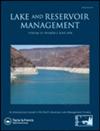Long-term cultural eutrophication in White and Walden Ponds (Concord, Massachusetts, USA), Thoreau's lakes of light
IF 0.8
4区 环境科学与生态学
Q4 LIMNOLOGY
引用次数: 1
Abstract
Abstract Stager JC, Harvey L, Chimileski S. 2020. Long-term cultural eutrophication in White and Walden Ponds (Concord, Massachusetts, USA), Thoreau’s lakes of light. Lake Reserv Manage. XX:XXX–XXX. Two historically important ponds in the vicinity of Boston, MA, were subjected to a comparative paleolimnological investigation of the timing and causes of eutrophication trends in each. The remarkable clarity of White Pond during the early 19th century led Henry David Thoreau to compare it favorably to nearby Walden Pond, but during the 20th century water quality in both ponds declined. Sediment core studies show that cultural eutrophication began at Walden during the 1930s, but no long-term sediment records have been available for White Pond, which makes it more difficult to determine the history and causes of eutrophication there. Here we use microfossil and geochemical analyses of sediment cores to show that major changes in the diatom community of White Pond began around 1900, when fish stocking commenced and soil erosion due to land use in the watershed increased, and that the trend intensified around 1960 and 1990. We also describe efforts to mitigate eutrophication at White Pond, highlight the ecological importance of benthic vegetation in nutrient cycling, and suggest that threats to water quality in both of these ponds will likely increase due to anticipated climatic changes in the region.怀特和瓦尔登池塘(康科德,马萨诸塞州,美国)的长期文化富营养化,梭罗的光之湖
[摘要]张建军,张建军,张建军,等。怀特和瓦尔登池塘(康科德,马萨诸塞州,美国)的长期文化富营养化,梭罗的光之湖。湖泊保护区管理。XX: XXX-XXX。在马萨诸塞州波士顿附近的两个历史上重要的池塘,对每个富营养化趋势的时间和原因进行了比较古湖泊学调查。19世纪早期,白池清澈的湖水使亨利·大卫·梭罗将其与附近的瓦尔登湖进行了比较,但在20世纪,两个池塘的水质都有所下降。沉积物岩心研究表明,瓦尔登湖的文化富营养化始于20世纪30年代,但没有长期的沉积物记录,这使得确定那里富营养化的历史和原因变得更加困难。本研究利用微化石和沉积物岩心的地球化学分析表明,白塘硅藻群落的主要变化开始于1900年前后,当时鱼类开始放养,流域土地利用引起的土壤侵蚀增加,并且在1960年和1990年前后趋势加剧。我们还描述了缓解白塘富营养化的努力,强调了底栖植被在养分循环中的生态重要性,并提出由于该地区预期的气候变化,这两个池塘对水质的威胁可能会增加。
本文章由计算机程序翻译,如有差异,请以英文原文为准。
求助全文
约1分钟内获得全文
求助全文
来源期刊

Lake and Reservoir Management
环境科学-海洋与淡水生物学
自引率
6.70%
发文量
22
期刊介绍:
Lake and Reservoir Management (LRM) publishes original, previously unpublished studies relevant to lake and reservoir management. Papers address the management of lakes and reservoirs, their watersheds and tributaries, along with the limnology and ecology needed for sound management of these systems. Case studies that advance the science of lake management or confirm important management concepts are appropriate as long as there is clearly described management significance. Papers on economic, social, regulatory and policy aspects of lake management are also welcome with appropriate supporting data and management implications. Literature syntheses and papers developing a conceptual foundation of lake and watershed ecology will be considered for publication, but there needs to be clear emphasis on management implications. Modeling papers will be considered where the model is properly verified but it is also highly preferable that management based on the model has been taken and results have been documented. Application of known models to yet another system without a clear advance in resultant management are unlikely to be accepted. Shorter notes that convey important early results of long-term studies or provide data relating to causative agents or management approaches that warrant further study are acceptable even if the story is not yet complete. All submissions are subject to peer review to assure relevance and reliability for management application.
 求助内容:
求助内容: 应助结果提醒方式:
应助结果提醒方式:


